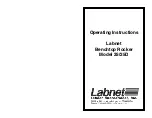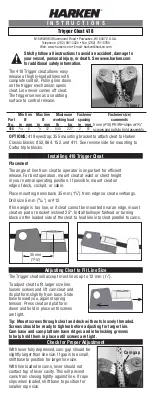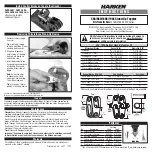
1-6
IM 701730-17E
1.6 Response to Interface Messages
1.6
Response to Interface Messages
Response to Interface Message
Response to a Uni-line Message
IFC (InterFace Clear)
Clears the talker and listener. Stops output if data is being output.
REN (Remote ENable)
Switches between remote and local modes.
IDY (Identify) is not supported.
Response to a Multi-Line Message (Address Command)
GTL (Go To Local)
Switches to local mode.
SDC (Selected Device Clear)
Clears the program message (command) which is currently being output. Also clears
the output queue (page 6-5).
*OPC
and
*OPC?
will be disabled if they are currently being executed.
*WAI
and
:COMMunicate:WAIT
will be stopped immediately.
PPC (Parallel Poll Configure), GET (Group Execute Trigger) and TCT (Take Control)
are not supported.
Response to a Multi-Line Message (Universal Command)
LLO (Local LockOut)
Invalidates SHIFT+CLEAR on the front panel to disable switching to local mode.
DCL (Device CLear)
Same as SDC.
SPE (Serial Poll Enable)
Sets the talker function to serial poll mode for all equipment connected to the
communications bus. The controller performs polling on equipment sequentially.
SPD (Serial Poll Disable)
Clears serial poll mode as the talker function for all equipment connected to the
communications bus.
PPU (Parallel Poll Unconfigure) is not supported.
What is an Interface Message?
An interface message is also called an interface command or bus command, and is
issued by the controller. Interface messages are classified as follows.
Uni-Line Messages
Messages are transferred through a single control line. The following three types of uni-
line message are available.
IFC (InterFace Clear)
REN (Remote ENable)
IDY (IDentifY)














































